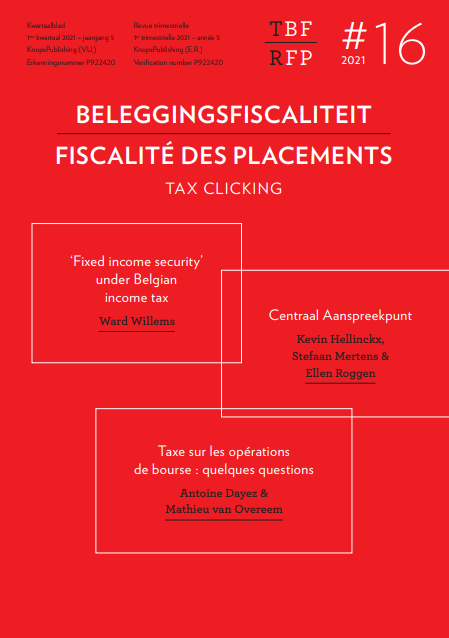Within the context of the taxation of interest income, a specific regime is applicable to so-called ‘fixed income securities’. While other securities producing interest income are taxed on a realisation basis, the taxation of fixed income securities is a form of yield-to-maturity based taxation, pursuant to which accrued yield may be taxable in the hands of the investor regardless of whether that yield has already been distributed by the issuer. This allows to tax certain gains on such securities as interest income where they would otherwise constitute capital gains.
Fixed income securities: relevance of the notion
The general interest income article can be found in article 19 of the Belgian Income Tax Code 1992 (ITC92). As a general definition, taxable interest income includes all interest, premiums and any other proceeds from loans, including from the granting of collateral on financial instruments, from deposits of money and from any other receivable. The recognition of movable income, in principle, requires the payment or attribution thereof by the debtor of the income. Article 19, § 2 ITC 92, on the other hand, lays down a specific tax regime for fixed income securities. The provision as it exists today is the product of several legislative stages and has been introduced as a reaction to the bond- and coupon stripping practices that persisted in the past, pursuant to which taxable interest income would be converted into non-taxable capital gains in the hands of private investors (e.g. by anticipated buy-back or liquidation of the securities by the issuer, or by intermediary sale of the securities on the secondary market). It essentially aims to counter such conversion, by taxing the accrued (undistributed) interest yield on the security as interest income instead of capital gains.
Difficulties relating to the application of the tax regime
In light of the foregoing, qualification as fixed income security has important tax consequences. Early buy-back or re-payment by the issuer or sale on the secondary market leads to the taxation of the accrued gain on the security as interest income, while such transaction with a (debt) security not qualifying as fixed income security would lead to the recognition of a capital gain which could generally remain untaxed in the hands of private investors. As such, any uncertainty, ambiguity or inconsistency as to the definition of fixed income securities may create tax arbitrage opportunities.
Additionally, the tax regime of article 19, § 2 ITC 92 creates a series of tax-technical and legal issues as to its application. The current regime only functions properly for Belgian securities and for securities with proportionate returns. Questions as to when the pro rata interest income (in case of transfer on the secondary market) is taxable are still not clearly settled. The administrative guidance, which considers pro rata interest to be taxable for income tax purposes at the time of intermediary transfer on the secondary market, yet only recognises a taxable moment for WHT purposes upon attribution of the interest income by the issuer, is contested in doctrine and certain case law and is especially curious since it leads to a reversal of the normal taxing sequence (income tax coming before WHT).
Finally, the qualification as fixed income security is important for the application of specific WHT exemptions. ‘Non-resident savers’, for example, benefit from a WHT exemption for interest received on Belgian dematerialised debt securities that are included in the X/N clearing regime that applies within the securities settlement system operated by the National Bank of Belgium (NBB-SSS). Only certain securities, that qualify as fixed income securities within the meaning of article 2, § 1, 8° ITC 92, are eligible for admission to the X/N system. Specific WHT exemptions may also apply to ‘non-resident savers’ for debt securities issued outside of the X/N system. Depending on the type of fixed income security, different WHT exemptions and conditions may be applicable.
Defining ‘fixed income securities’
Fixed income securities are defined as bonds, ‘bons de caisse/kasbons’ and other similar securities, including securities of which the income is capitalised (e.g. capitalisation bonds) or securities that do not yield any coupons during their term and that are issued with a discount equal to the capitalised interest at maturity of the security (zero-coupon bonds). Equally included in this definition are so-called ‘capitalisation operations’ (branch 26 insurance products)
Bonds are the classic example of fixed income securities. Qualification of a security as a ‘bond’ is dependent on the fulfilment of the basic conditions of what constitutes a bond. Under Belgian law, three constitutive elements are generally put forward: (i) the existence of a ‘loan’ agreement in a civil law sense (i.e. capital guarantee), (ii) a ‘collective nature’ and (iii) representation by transferable securities. In the absence of one or more of these ‘hallmarks’, the agreement may not qualify as a bond loan.
‘Bons de caisse’ or ‘kasbons’ are generally described as securities representing a receipt of repayable funds, with or without capitalisation of interest, that are issued in a continuous or repeated manner by credit institutions. Financial law and tax law makes reference at numerous occasions to the notion, without laying down a precise definition. There has been some discussion in financial law doctrine whether these types of securities qualify as ‘bonds. At the income tax level, that issue is less problematic since both types of securities are either consistently mentioned next to one another or benefit from a similar tax treatment under different provisions. An important difference made between bonds and bons de caisse in Belgium is that the latter can benefit from a deposit guarantee (DGS protection) while such protection is not foreseen for bonds.
First of all, in order to qualify as fixed income security, the instrument concerned should qualify as a ‘security’ (titre/effect). In Belgian legal doctrine, these are traditionally defined as negotiable legal titles that allow for a productive investment of capital and that incorporate one or more rights, which can be exercised or transferred by presentation of that legal title, which would exclude pure derivatives. The MiFID II Directive and the Belgian implementing legislation use the notion of “transferable securities” (“effecten”/“valeurs mobilières”). Transferable securities should be – as a class – transferable, standardised (fungible, interchangeable) and negotiable on a capital market.
The Belgian Minister of Finance confirmed that commercial paper, issued in conformity with the conditions laid down in the Law of 22 July 1991 related to commercial paper and certificates of deposit, qualifies as fixed income securities.
According to the traditional administrative view, real estate certificates qualify as fixed income securities. Such qualification is also accepted in the majority of case law. That view has nonetheless been criticised in legal doctrine.
The administrative guidance also qualifies units in (regulated) common funds as fixed income securities.
Products assimilated to fixed income securities are also included, such as shares in certain investment companies (‘FIX-funds’) and capitalisation operations (branch 26 insurance).
More topical for today’s financial practice is the application of the ‘fixed income security’ notion to so-called ‘structured securities’: a structured product as a legally inseparable linear combination of at least two ‘non-structured financial instruments’, consisting of (i) at least one non-derivative financial instrument (e.g. a bond) and (ii) one or more derivatives (e.g. option, swap, future). Legal inseparability means that only the product as a whole can be sold, assigned or can be the object of a collateral agreement. The combination of a non-derivative and derivate financial instrument excludes mere combinations of derivatives only. Examples of structured securities that meet the above definition are i.a. index-linked notes (combination of a zero-coupon bond with a call-option on the respective index), credit-linked notes (combination of a bond with a credit default swap) or reverse convertible or exchangeable bonds (combination of a bond and a put option for the bond issuer).
Ward Willems, PhD Candidate, Institute of Tax Law, KU Leuven
This article is a abbreviated version of an article Ward Willems wrote for Tijdschrift Beleggingsfiscaliteit/Revue Fiscalité des Placements, in which he makes a thorough analysis of the Belgian tax regime on fixed income securities.





0 commentaires